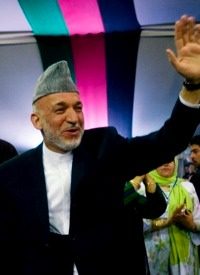
Afghanistan’s Independent Election Commission released figures on September 16 showing President Hamid Karzai with 54.6 percent of the vote in the first complete results reported since the country’s August 20 presidential election. However, the results will not be certified until the UN-backed Electoral Complaints Commission finishes examining thousands of potentially fraudulent ballots.
An AP report quoted Waheed Omar, a spokesman for Karzai’s campaign, who said that Karzai was "clearly leading in the elections and we have bypassed the 50 percent benchmark that is required for someone to win the first round. We hope that when the certified results are announced we will win the election in the first round." Under Afghan law, if no candidate receives more than 50 percent of the vote, a run-off election must be held.
The Election Commission reported that Karzai had received more than three million votes, with more than 1.5 million votes counted for his leading challenger, former foreign minister Abdullah Abdullah.
On the same day as the Election Commission’s announcement, Phillippe Morillon, head of the European Union election observer mission, told Reuters news that his team believed 1.5 million votes were suspicious, including 1.1 million cast for Karzai and 300,000 cast for Abdullah.
Reuters noted that if all the votes described by Morillon as "suspicious" were to be removed from the preliminary vote tally, Karzai would fall just short of the 50 percent needed to win outright, and would face a run-off against Abdullah.
Morillon said fraud had been carried out by "unscrupulous, overzealous supporters … from every camp," and that fraudulent ballots needed to be removed from the count before any result could be considered final. "Any claim for any count or of victory will be premature and not credible," said Morillon.
BBC news reported that Karzai’s team reacted angrily to the EU monitors’ assertions, issuing a counter-statement that read: "Today’s announcement of the number of suspected votes, by the head and deputy head of the EU Election Monitoring Commission, is partial, irresponsible and in contradiction with Afghanistan’s constitution."
The Karzai team statement said the monitors should be referring their findings to the Independent Election Commission and the Electoral Complaints Commission, noting: "We believe the only way we can have a legitimate result out of the current process is to allow the legal institutions to complete the process and refrain from interfering in their affairs."
BBC also reported that there was a strong difference of opinion within the U.N.’s Electoral Complaints Commission between Kai Eide, the Norwegian diplomat who heads the commission and his U.S. deputy, Peter Galbraith, but that Eide denied reports that he had ordered Galbraith to leave the country. Galbraith reportedly advocated a wholesale recount of the votes, a position that Eide apparently did not agree with.
On September 14, Abdullah Abdullah, the second place candidate, warned in an interview with McClatchy Newspapers that if President Karzai’s reelection is based on a fraudulent vote, the U.S.-led war against al-Qaida and the Taliban in Afghanistan will fail.
"We will have a vacuum of power, security and stability," Abdullah told a reporter from the U.S.-based newspaper chain. "Five years of illegitimate rule cannot be sustained by more troops or more resources."
The report quoted Abdullah’s account of his visit to Charikar in Padrwan Province north of Kabul on September 13, where he met some of his frustrated supporters who wanted to demonstrate their discontent. He said he urged them to be calm but added that he couldn’t predict what will happen. "I will do my utmost to avoid violence. I know how difficult it is to reverse things once they go in that direction," said Abdullah. "But I can’t guarantee anything and everything that will happen in this country. Nobody can."
McClatchy reported on September 12 that Afghanistan’s independent election commission decided to lower its standards during the previous week to be able to count enough votes to put Karzai over the 50 percent threshold needed to avoid a runoff election. The news organization stated that on August 29, the commission established a set of standards to exclude questionable votes, but when an analysis of the results using that forumla showed that the exclusions would reduce Karzai’s tally below 50 percent, the commission cast a second vote on September 7 to loosen the fraud standards. McClatchy cited a commission official and Western official in Afghanistan as its source.
As with our military adventure in Iraq, the chaotic political situation in Afghanistan is bound to raise questions concerning the value of squandering endless dollars and American lives in an attempt to bring a stable government to nations that — according to our standards — may very well be ungovernable.
Photo of Hamid Karzai: AP Images



